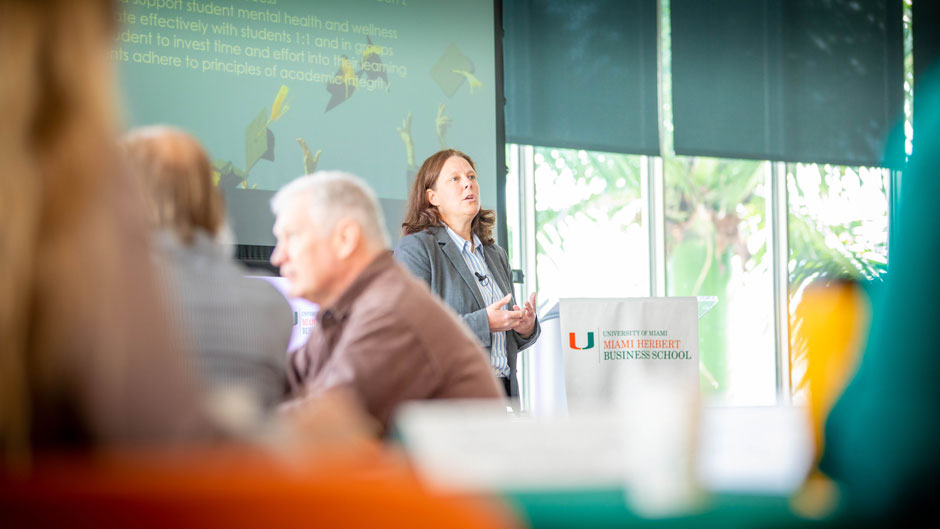The youngest, most ethnically diverse, and largest generation in United States history is anxious, pragmatic, and passionate to change the world—and are looking to college educators to help them, Corey Seemiller, a college teacher and adviser for more than 20 years, recently told an audience at Storer Auditorium in the University of Miami Herbert Business School.
“My whole premise as a college educator is to leverage the dreams of these young people who are more interested in making a difference in the world than making money,” Seemiller said. “Wouldn’t it be great if we, as college educators, could find more ways to help them make that change?”
Seemiller’s talk, “Educating and Engaging the Next Generation of Students,” was hosted by the School of Education and Human Development, the Miami Herbert Business School, and the Platform for Excellence in Teaching and Learning (PETAL), a component of the University’s Roadmap to Our New Century initiative launched in August 2019 and designed to elevate the art of teaching and enhance students’ learning experience.
Leewin Louder, a first-year doctoral student in the Counseling Psychology Program in the School of Education and Human Development, attended Seemiller’s seminar seeking to better understand the relationship between teens and trauma, a focus of her research.
“Her talk served as an antidote to a lot of the negative media that we hear about this generation,” said Louder, adding that she was especially interested to learn more about the entrepreneurial zeal and innovative spirit of Generation Z.
In an interactive workshop that followed Seemiller’s seminar, Lisa Beal, professor in the Ocean Sciences Department at the Rosenstiel School of Marine and Atmospheric Science, echoed the researcher’s assessment that educators need to help Generation Z unlearn the misinformation they glean from the internet.
“Science is not normative as in other areas, there is a right and wrong,” Beal said. “It can be frustrating because there’s a lot of misunderstanding about climate sciences.” Beal acknowledged that she started her classes asking students what they know, think, and feel about the topics to provide accurate scientific information.
Though today she is recognized as “the Gen Z speaker,” a few years ago Seemiller was essentially unaware of the budding post-millennial generation weaned on the internet and social media. In 2013, in both advising sessions and her classes on leadership and civic engagement, she began to notice a profound shift in the questions that students asked about their education and careers. More than “majors,” they wanted outcomes. More than “degrees,” they wanted competencies, she said. They looked to education as an avenue to funnel their dreams, she added.
According to Seemiller, their questions were prompted by the world they were witnessing and experiencing.
“Context matters,” said Seemiller. “The defining events that occur, especially during adolescence, shape attitudes and behaviors that persist for the rest of our lives.” In her own life, as a seventh-grader sitting in her science class in Sarasota, Florida, she watched the Space Shuttle Challenger explode into the atmosphere barely a minute after taking off and knew her life would never be the same.
Seemiller said that both “Big Zs”—born 1995-2002—and “Little Zs”—born 2003–2010—have been indelibly imprinted by the Great Recession, the housing and financial crisis that climaxed in 2008.
As a result, she explained, members of Gen Z are adverse to loans and working more jobs. They are making careful, cost-conscious decisions about higher education. “And this at a time when higher education is more expensive than ever,” Seemiller pointed out. This tension emphasizes the importance of more effectively engaging this new wave of students.
Ann Olazabal, professor and vice dean of Undergraduate Business Education, and John Quelch, dean of the Herbert Business School, introduced Seemiller and welcomed the opportunity to share new insights with University educators.
“PETAL aims to inculcate good teaching practices for new faculty, and we have to keep our eyes open and find new ways to build bridges between faculty and our students,” Olazabal said.
“Three words—determined, open-minded, and compassionate—sum up this new generation, and we’re excited to learn more about what these students are looking for within and outside the classroom,” added Quelch.
Seemiller noted that when she first noticed the shifting nature of her students, she sought ways to connect with them. She binge-watched the “Twilight” movies, popular at the time, and then used some of the references and phrases in her conversations. The attempt didn’t get far.
“It’s bigger than the words, it’s not as simple as that,” Seemiller said. “You have to understand their context—the experiences that have formed them—in a way that’s meaningful to them.”
In her presentation, Seemiller offered a wide-ranging assessment of the habits, motivations, and characteristics of Generation Z drawn from her qualitative studies:
- Technology addiction: 50 percent say they are addicted to cellphones and computer tablets.
- 24/7 access via the internet: includes the visualization of horrific traumas and violence.
- Self-educated: learning from the internet includes misinformation, inaccuracies, and the inability to differentiate credible facts and sources from bogus ones.
- Mental health: prone to depression, stress, and mental health issues.
- Absence of real friendships: many obsessively monitor the lives of celebrities to the point of experiencing “vicarious trauma”—where they suffer the emotional turmoil of their obsessions.
- Prejudice and discrimination: They are confused by the regressions in human rights.
- Environment is their number one concern.
- Their parents are their primary role model.
- Characteristics: They describe themselves as responsible, loyal, compassionate, among other attributes, and say their peers lack these same qualities.
- Diversity: 49 percent are nonwhite. They are racially diverse, gender fluid, and unaffiliated to specific religions.
- Crave feedback and validation.
- 83 percent say they like face-to-face communication (meeting with professors is popular). 60 percent texting. 35 percent phone. 27 percent email.
- Demonstrated learning: Their preferred learning modality.

